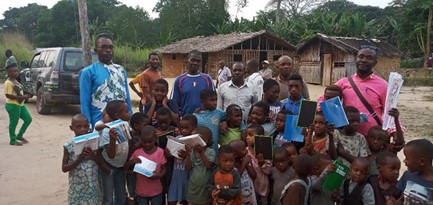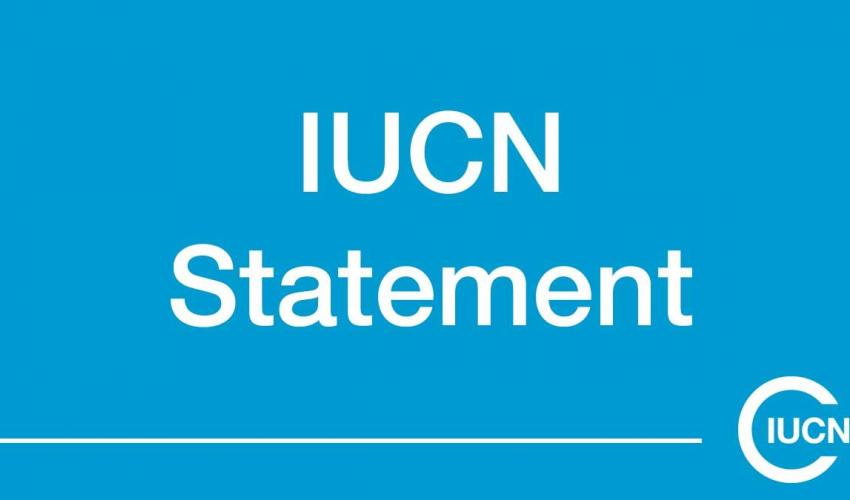Indigenous Peoples in Gabon: Industrialization of the Timber Sector and Safeguarding of Traditional Forestry Knowledge
CEESP News: Emmanuel Mvé Mebia, IUCN CEESP member.
Based on the recommendations of the 2nd International Forum of Indigenous Peoples of Central Africa (Impfondo, March 15-18, 2011), this article reflects the action plan to coordinate efforts to protect the rights of Indigenous Peoples. It is within this framework that the Baka of North Gabon occupy an important place in the planned logging process in North Gabon.

Photo: Emmanuel Mvé Mebia
An Initiative in Favor of Indigenous Peoples
The CPFBH project (Cogestion du Patrimoine Forestier avec les Baka du Haut-Ntem) was officially submitted on March 18, 2022. It is part of a vast and ambitious program, entitled PISCCA (Innovative Projects of Civil Societies and Stakeholder Coalitions), initiated by the Cooperation and Cultural Action Service (SCAC) of the French Embassy (2022). It is structured around three priority areas and three specific objectives.
Of the priority areas, it is appropriate to note, among others:
-
the recognition of the theoretical knowledge and traditional practices of the Baka populations,
-
recognition of their flora-based livelihoods, and
-
respect of the social and physical environment of the Baka in the Congo Basin.
As for specific objectives, it is worth noting:
1) the reduction of extreme poverty among the Indigenous Peoples of Haut-Ntem,
2) the involvement of Baka women in the process of managing non-timber forest products (NTFPs),
3) the assurance of full education for Baka children of Minvoul, in a region recently coveted by a new category of forest managers.
Located in the northwestern periphery of the Minkébé National Park, the CPFBH project, which is the result of a series of community consultations, aims to contribute to the endogenous development of the Indigenous Baka populations, by supporting them long-term and by promoting the governance mechanism and the effectiveness for the establishment of value chains from forest resources.
Local Context of the CPFBH Project
The far north of Gabon has not escaped logging. Here, the particularity is that it developed on the scale of a "Cathedral Forest," progressively emptied of its inhabitants since the 1920s, who were relocated (KNIGHT, Judy, 2005). On the ground, there is no doubt about the launch of the work. It was during the launch of a cultural project (dedicated to the opening of the first Pygmy school) that we saw this sign planted at the end of the Doumassi village inhabited by the Baka (Indigenous People) (see photo of February 4, 2022. Source: Mvé Mebia, E).
It should be noted that the exploitation of certain forestry concessions raises a number of concerns, given the methods deployed and especially because of the request for contractual specifications, which in most cases do not exist.
In the large forest that extends from the Woleu department (Oyem) to the Haut-Ntem department (Minvoul), we note the presence of large forestry companies (TTIB, CDG), privileged managers operating in this sector. In planning their activity in the northern part of the Minkebe National Park (Gabon), the Dan Gabon Company (CDG) is opting for sustainable management of the 180,633 hectare Forest Management Unit. It is unclear, however, whether with the resumption of activities interrupted in 2020, a memorandum of understanding had been established involving the Indigenous Baka peoples.
Based on the assumptions made, no consensus–sensu lato–seems to have been formally established in relation to the lifestyle with the communities present, whose lifestyle depends on forest resources. However, concern remains over the principle of zoning, relating to the apprehension of the different spaces, both industrial uses that are imposed and customary and permanent access to natural resources, in the medium or long term.
At this crucial point, particular attention is paid to the maintenance of traditional knowledge applied to the flora. In other words, the needs of Indigenous and local populations in regards to nutritional and medicinal plants and the preservation of vital ecosystems seem to be ignored by forest managers. This reflection (in conjunction within the Association Culture Nature Edzengui) has led to the development of a flagship project.
This project highlights five Sustainable Development Goals (SDG 1, SDG 2, SDG 10, SDG 12, SDG 16).
Divergent Interests between Forest Managers and Indigenous Populations
In addition to the Temporary Development - Exploitation - Transformation Agreement (CPAET) covering 140,000 hectares, granted to TTIB in October 2004, this one had to engage in a sustainable development process has embarked on a process of sustainable development, first in partnership with the Forestal-Gabon Company, then since September 2008, with the TERRA Company. Since 2020, based on the new forest configuration in the northern zone of the Minkébé National Park, there are six forest concessions, including five forest concessions under sustainable management (CFAD) and a Provisional Agreement for Development-Exploitation-Transformation, for an area of 2333 square kilometers. The Edzengui association, which is carrying the GPRF project, is seeking support from its partners for the implementation of the project, which is programmed by the SCAC (Service de Coopération et d'Action Culturelle).
Participation of Indigenous Peoples
The co-management of the forest heritage with the Baka of Haut-Ntem (CPFBH) is a new concept, which comes in addition to another one: "Access to education of the Baka children of Minvoul" (in progress).
It requires the long-term support of Indigenous populations and local communities. It is working to integrate the forestry authorities and those of the Haut-Ntem Departmental Council into its strategy, through the Local Management Advisory Committee (LMC). While a wood processing plant was inaugurated in Haut-Ntem on May 3, 2020 and the signal for logging has been given, Indigenous populations are looking for a school for Baka children in Minvoul.



